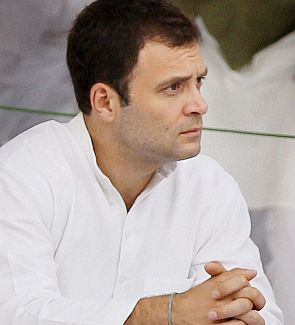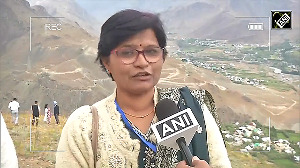 After embarrassing his own government by publicly thrashing its ordinance on convicted legislators in public, Congress vice-president Rahul Gandhi on Friday trained his guns at the Maharashtra government for rejecting the Adarsh Inquiry Commission report.
After embarrassing his own government by publicly thrashing its ordinance on convicted legislators in public, Congress vice-president Rahul Gandhi on Friday trained his guns at the Maharashtra government for rejecting the Adarsh Inquiry Commission report.
“I do not agree with the decision of the Maharashtra government to reject the Adarsh enquiry report, I think they should reconsider this decision,” Rahul declared at a media briefing on Friday evening even as an embarrassed Maharashtra Chief Minister Prithviraj Chavan sat next to him in silence.
Chavan later told media persons that he would get back after discussing this matter with his Cabinet colleagues.
The press briefing had been called to brief the media about Rahul Gandhi’s day-long deliberations with chief ministers of Congress-ruled states on the twin issues of corruption and price rise for which the party dearly in the recent assembly elections.
Although the time-bound action plan drawn up at the meeting to deal with inflation and graft was meant to be the centerpiece of the press conference, the proceedings were literally hijacked by the Adarsh issue.
Unlike the last time when an angry Rahul had stormed into a press conference and declared that the “ordinance was nonsense”, the Congress vice-president was far more restrained in his comments today.
Nevertheless, Rahul did not shy away from expressing his views on the subject when asked if there was a dichotomy between the Maharashtra government’s rejection of the Adarsh report and Friday’s discussions on corruption.
He refused to get drawn into a prolonged discussion on this issue despite persistent queries from the floor if his comment on the Adarsh report should be taken as a direction to the chief minister.
Realising that the situation could out of hand, his media managers quickly wound up the press conference.
Congress sources said the Maharashtra government’s recent decision to reject the Adarsh enquiry commission report was raised during the meeting by an office bearer who felt this move had embarrassed the party as it comes at a time when the party has been reiterating its commitment to combat corruption.
Chavan intervened at this point to say that he would like to discuss this matter later with the Congress vice-president.
After the meeting, Rahul had a one-to-one interaction with all chief ministers, including Chavan. Rahul is learnt to have conveyed his views on the Adarsh issue to Chavan during their talks. His subsequent comments at the press conference flowed from these discussions.
Chavan now finds himself in a tight spot. While Rahul has made it clear he is not happy with the Maharashtra government’s decision, he is under pressure from his Cabinet colleagues who had unanimously rejected the enquiry report.
The enquiry commission, headed by retired high court judge J A Patil, has noted that Ashok Chavan gave permission to the housing society as a quid pro quo for two flats allotted to his relatives. The report has also named three other former chief ministers, Vilasrao Deshmukh, Sushil Kumar Shinde and Shivajirao Patil Nilangekar for extending political patronage to the housing society.
Two NCP ministers -- Sunil Tatkare and Rajesh Tope -- have been held responsible for misusing their political positions to promote this housing project. In addition, twelve bureaucrats have been found guilty of violating conduct of service rules.
Ironically, the Maharashtra government’s decision came shortly after Rahul Gandhi had spoken out passionately that the Congress is “dead serious about fighting corruption” and made a strong pitch for the passage of the Lokpal Bill.
The Congress vice-president spoke in the same vein on Friday. The Lokpal Bill, he declared, was only one step in the party’s fight against graft. “If we have to fight corruption, we need a framework not just at the national level but also state level,” Rahul asserted, adding that a host of anti-graft Bill are pending in Parliament but the opposition was not serious about passing these laws.
“Let’s stop talking let’s start acting. Let’s get together and pass these Bills,” he maintained, stating that if necessary a special session of Parliament can be called for this specific purpose.
Having taken the initiative on the corruption front, Rahul directed all Congress-ruled states to enact new Lokayukta legislation by February 29,2014 in line with the Lokpal which was passed by the Centre in the recently-concluded winter session of Parliament.
During the discussion on the Lokpal Bill, Congress communications department chief Ajay Maken pointed out that the Lokayukta Act enacted recently by the Gujarat government was far weaker than the Bill passed by the Centre as the anti-graft ombudsman had to report to the chief minister.
Besides discussing the roadmap for the implementation of the anti-corruption law, the chief ministers’ meeting also focused on food inflation for which the Congress paid a heavy price in the recent assembly polls.
It was, therefore decided that all Congress-ruled states will delist fruits and vegetables from APMC acts by January 15 so that farmers have a choice and consumers can benefit from lower prices.
Similarly, Congress chief ministers have been asked to take stringent measures against hoarders by invoking the Essential Commodities Act. Rahul Gandhi has also asked them to detain chronic offenders under the Prevention of Blackmarketing and Maintenance of Supplies of Essential Commodities Act.
They have also been directed to streamline the Public Distribution System to eliminate leakages and ensure food reaches the intended users.
All Congress-ruled states, it was decided, will take steps to open fair price shops, either government-ruled or run by women so that fruits and vegetables and eggs can be sold at reasonable prices to consumers.



.jpg)






